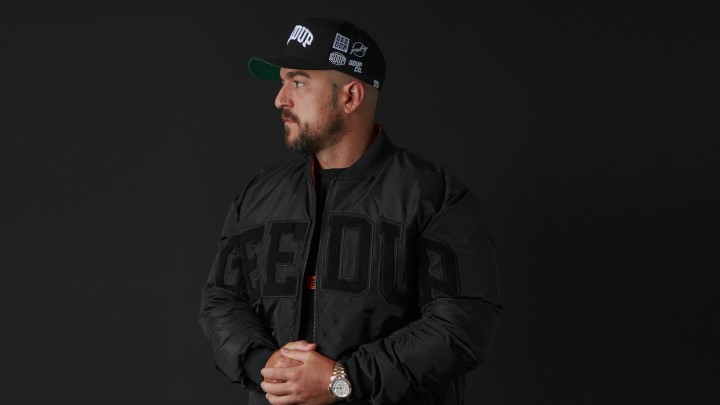Australian streetwear brand Geedup is known for its monthly drops of hoodies, track pants and other apparel that regularly sell out in minutes, its opulent campaign videos featuring fast cars and flashy watches, and its behind-the-scenes posts on social media. Founded by Jake Paco in a garage in western Sydney, and inspired by hip-hop culture, the brand has amassed a devoted following since launching in 2010, and after pivoting to an online-only model in 2019, the business took off. With a
With annual revenue now topping $20 million, and growing 150 per cent year on year, Geedup is starting to eye opportunities for overseas expansion.
The brand debuted at fashion and sneaker expo ComplexCon in 2021, and recently opened an office in Los Angeles with the help of streetwear veteran AJ Garcia of Crooks & Castles.
Geedup has reached this point despite – or perhaps, because of – ignoring many of the ‘rules’ of modern retail. It only started doing email marketing in the last two months, having previously relied on SMS to communicate with customers.
“We’re not even running at full capacity – that’s the scary part,” Geedup’s general manager Trevene (TK) Patrick said at Retail Fest, an industry event, in March.
Paul Waddy, co-founder of online retail consultancy Ecom Nation, which started working with Geedup last year, believes the brand could easily reach $100 million in global revenue.
One of the key ingredients in Geedup’s success is its constant focus on brand. Waddy noted that the entire team, which currently numbers five people, wears Geedup clothing to work every day.
“It’s a family. That’s how the brand runs,” Waddy said at Retail Fest.
Providing a sense of belonging
Paco initially conceived of Geedup as a way to escape the chaotic lifestyle he was leading in his teens and early 20s. He left school after Year 10 and worked as a furniture mover to pay for a graphic design course. But six months into his first graphic design job, he realised it wasn’t for him.
“I stopped working and I went back to what you would call the streets,” he told Inside Retail.
“Every three to six months, a close friend of mine would end up in jail. Before that, I’d lost some friends to death – car accidents and silly crimes. That’s when I realised I was on the wrong path, so I went back to design.”
This time, he focused on building his own brand – one that reflected his love for hip-hop culture and his community.
“Geedup was always this dream – that it could be something that my friends and family would be proud of, so I could be proud of myself,” Paco said. “I thought if I could bring this to the world stage, it could provide a sense of belonging to men like me.”
The brand was an immediate hit in western Sydney, where Paco’s story was a familiar one. In 2013, he took over the lease of a friend’s store, and started selling Geedup products alongside some of his favourite streetwear brands. But behind the scenes, the business was struggling.
“We had no handouts, no knowledge of retail manufacturing, we were just forced to act on any opportunity,” he said.
In 2017, with a daughter on the way, it became too much.
“I had some mental health issues – all the things tied to my teenage years and early adult life just snuck up on me, so I took some time off, got my head right, got my heart right, and really looked at my purpose in life,” Paco said.
“One thing that I kept being led back to was the brand – because of what the brand stood for.”
The start of something big
In 2019, armed with a better understanding of data, manufacturing and design, Paco relaunched Geedup as an online-only business centred around monthly drops, and the brand has been going from strength to strength ever since.
One of Geedup’s recent drops brought in $3 million in 24 hours. But for Paco, the brand has always been about much more than simply selling products. It’s about showing people who are surrounded by crime and violence that there’s another way out.
“A lot of the time, when people introduce the brand, they say Geedup is all about the streets, but our message is trying to get you out of the streets,” he said.
In March, the brand announced a new, long-term partnership with Confit Pathways, a non-profit organisation that helps formerly incarcerated youth reintegrate into society.
As part of this, Geedup is donating $250,000 from sales of its Blacked Out collection to help Confit Pathways build a gym in Parramatta. The idea is that participants in Confit Pathways’ rehabilitation program can become personal trainers, and then get a job at the gym and build their own client base.
“I feel like there’s a lot of crossover between Confit Pathways and Geedup in the sense of what we are trying to bring to the community,” Paco said.
“It’s not just pledging dollars, that’s a very easy thing to do. It’s more important for us to be on the ground, be involved, hear the stories and share my story and show these kids that there’s another way out.”
Beyond the initial donation, Paco hopes to expand Geedup’s community team and have one or two employees who are dedicated to visiting schools and speaking with kids.
“I feel like it’s really just the start of something big for both brands,” he said.

